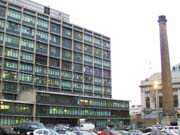While the Hudson County Administration Building on Newark Avenue isn’t falling down, it may have much more serious problems than anyone knew.
Hudson County Freeholders learned the distressing news at their Oct. 21 caucus when they were considering an amendment to a resolution to a $1.7 million repair contract.
The original request for proposal was for $1.7 million. But during the course of the investigation and conceptual design, engineers determined that this amount was not a realistic figure and discovered many more problems.
This included definite problems with the heat and air conditioning, but also possible problems in the fire suppression system and smoke detector systems.
Although County Administrator Abe Antun said problems with the fire safety systems had been addressed, Freeholder Bill O’Dea said the information was disturbing since it could leave the county open to litigation unless there is positive proof that the building is indeed safe.
During the course of the design development phase, Paulus, Sokolowski & Sartor determined that much of the building’s equipment was ineffective, no longer operable, outdated and no longer in compliance with current codes and standards,” the county resolution concluded.
O’Dea also questioned the wisdom of investing in a building that is in such dire need of repair. Antun argued that repairs – which would likely mount up into many millions of dollars – was designed to keep the building in place for a few more years until a new building can be considered for the site.
O’Dea, however, blasted the administration, noting that in 1994, the county sold this and other buildings to the Hudson County Improvement Authority in order to balance the budget.
In what is largely considered as a bookkeeping trick, the county sold many of its buildings to the HCIA in order to get a one-time benefit in the budget. This included Pollak and Meadowview hospitals.
“Now we’re stuck with the lease payments,” O’Dea said. “If we tear down that building to construct a new one, then we will be stuck with the payments on empty space as well as the cost of construction.”
Freeholder Al Cifelli said problems with the air conditioning go back many years, and perhaps the system never worked correctly. Cifelli noted that window air conditioners are evident in many of the offices, despite the building’s central air conditioning. He also noted that because of the lack of air conditioning, many of the windows had to be left open, even in the court, and that often traffic noise made it difficult for people to hear during trials.
Chairman Sal Vega said he was concerned with the process, noting – as O’Dea had – that most of the money allocated to the project had been spent without freeholders being warned about a possible problem.
The project was supposed to take place in four steps, but because of the dire condition of the heat and air conditioning systems, the entire approved amount was used up in the first phase alone.
The matter will be reviewed in committees for later consideration.
